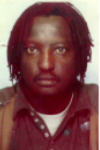Author Watch
BINYAVANGA WAINAINA

Wannabe Africa writers? Please follow Wainaina's advice, which runs thus:
Always use the word 'Africa' or 'Darkness' or 'Safari' in your title. Subtitles may include words 'Zanzibar','Masai','Zulu','Zambezi','Congo','Nile','Big','Sky',
'Shadow','Drum', 'Sun' or 'Bygone'.
Also useful are words such as 'Guerrillas''Timeless', 'Primordial' and 'Tribal'. Note that 'People' means Africans who are not black, while 'The People' means black Africans.
Never have a picture of a well-adjusted African on the cover of your book, or in it, unless that African has won the Nobel Prize. An AK-47, prominent ribs, naked breasts: use these. If you must include an African, make sure you get one in Masai or Zulu or Dogon dress.
In your text, treat Africa as if it were one country. It is hot and dusty with rolling grasslands and huge herds of animals and tall, thin people who are starving. Or it is hot and steamy with very short people who eat primates. Don't get bogged down with precise descriptions. Africa is big: fifty-four countries, 900 million people who are too busy starving and dying and warring and emigrating to read your book. The continent is full of deserts, jungles, highlands, savannahs and many other things, but your reader doesn't care about all that, so keep your descriptions romantic and evocative and unparticular.
For more read here.
Binyavanga Wainaina, Kenyan playwright and journalist shot to fame when his short story Discovering Home won him the prestigious Caine Prize for literature in 2002. In his acceptance speech at the award ceremony held in Oxford, he pointed out how the voice of the new Africa needs to be heard.
At home we cannot walk into bookshops and see ourselves, and we cannot see ourselves on television. I think it's peculiar that at a time when Kenya is going through a recession a new generation of artists has come up, and young people are finding money they don't have, to go and listen to music, to listen to stand-up comedians, and for the first time they see reflections of themselves. This is the first-born generation of independent Africans, and this voice must come out.
When he was twenty, Wainaina went to live in South Africa. Here he realized that the apartheid regime wasn't any worse than the government of Daniel Arap Moi. This is what he has to say.
When I went to live in South Africa, I immediately began to understand what went wrong. Because here was a place supposed to be under apartheid – I arrived there in 1991 – but here a black person had more say and had more influence over his white government than an average Kenyan had over the Moi government.
Wainaina now lives in Nairobi, Kenya. His first novel The Fallen World Of Appearances has just been published.
BINYAVANGA WAINAINA

Wannabe Africa writers? Please follow Wainaina's advice, which runs thus:
Always use the word 'Africa' or 'Darkness' or 'Safari' in your title. Subtitles may include words 'Zanzibar','Masai','Zulu','Zambezi','Congo','Nile','Big','Sky',
'Shadow','Drum', 'Sun' or 'Bygone'.
Also useful are words such as 'Guerrillas''Timeless', 'Primordial' and 'Tribal'. Note that 'People' means Africans who are not black, while 'The People' means black Africans.
Never have a picture of a well-adjusted African on the cover of your book, or in it, unless that African has won the Nobel Prize. An AK-47, prominent ribs, naked breasts: use these. If you must include an African, make sure you get one in Masai or Zulu or Dogon dress.
In your text, treat Africa as if it were one country. It is hot and dusty with rolling grasslands and huge herds of animals and tall, thin people who are starving. Or it is hot and steamy with very short people who eat primates. Don't get bogged down with precise descriptions. Africa is big: fifty-four countries, 900 million people who are too busy starving and dying and warring and emigrating to read your book. The continent is full of deserts, jungles, highlands, savannahs and many other things, but your reader doesn't care about all that, so keep your descriptions romantic and evocative and unparticular.
For more read here.
Binyavanga Wainaina, Kenyan playwright and journalist shot to fame when his short story Discovering Home won him the prestigious Caine Prize for literature in 2002. In his acceptance speech at the award ceremony held in Oxford, he pointed out how the voice of the new Africa needs to be heard.
At home we cannot walk into bookshops and see ourselves, and we cannot see ourselves on television. I think it's peculiar that at a time when Kenya is going through a recession a new generation of artists has come up, and young people are finding money they don't have, to go and listen to music, to listen to stand-up comedians, and for the first time they see reflections of themselves. This is the first-born generation of independent Africans, and this voice must come out.
When he was twenty, Wainaina went to live in South Africa. Here he realized that the apartheid regime wasn't any worse than the government of Daniel Arap Moi. This is what he has to say.
When I went to live in South Africa, I immediately began to understand what went wrong. Because here was a place supposed to be under apartheid – I arrived there in 1991 – but here a black person had more say and had more influence over his white government than an average Kenyan had over the Moi government.
Wainaina now lives in Nairobi, Kenya. His first novel The Fallen World Of Appearances has just been published.

0 Comments:
Post a Comment
<< Home